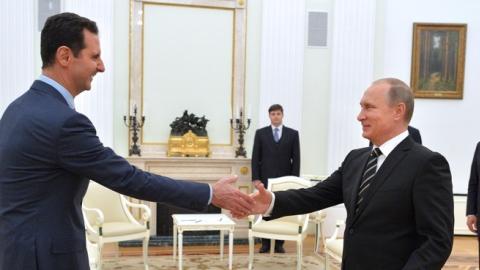Mainstream media, and even some conservative commentators, have spent the weeks since the election obsessing on Donald Trump’s supposedly over-cozy relationship with Russia and speculating about whether he’ll be a hopeless weakling when dealing with Vladimir Putin. This view conveniently overlooks that Putin already has a patsy in the White House, Barack Obama. Obama hasn’t earned the nickname “Putin’s poodle” for nothing, and the effects on U.S. foreign policy have been nothing less than disastrous — especially in the Middle East.
Nothing demonstrates that more than the cease-fire in Syria negotiated last Thursday by Russia and Turkey.
Cease-fires in the Middle East are notoriously shaky. This one went into effect on Friday, and within hours violations were reported. But those who focus on who’s violating the cease-fire and who’s not, or on who will show or not show up at the peace conference in Kazakhstan that Putin and Erdogan have announced, miss the point. The deal is one more extension of Russia’s growing influence — what earlier in this space I branded “the Pax Putinica” — in the Middle East. Whatever happens next, it’ll be Russia, Turkey, and Bashir al-Assad’s patron Iran that will be the main actors, while the United States sits ignored and impotent on the sidelines.
The Pax Putinica began the moment President Obama failed to enforce the “red line” he had drawn regarding Assad’s use of chemical weapons in the budding civil war in Syria. Obama’s lapse gave Putin the opening he needed to negotiate a deal with the Syrian dictator, who would give up the weapons — as Russia gained its first firm foothold in the Middle East since the 1970s.
Obama didn’t just open the door for Putin. He all but shoved him through, as he encouraged Russia’s role as intermediary in the Syrian conflict until it grew into full-scale intervention in 2015. While Obama stood by, Russian military operations became crucial to preserving Assad’s rule. Assad felt free to revert to using chemical weapons when it suited him, while Russian bombs that were supposedly aimed at “terrorists” wound up killing helpless civilians and targeting the Free Syrian Army and other groups that we once supported but that Obama had now largely abandoned — just as we once paid lip service to regime change in Syria but, by doing nothing, now give silent assent to keeping Assad in power.
So the new Syrian cease-fire represents much more than an attempt to stop the killing that’s left more than half a million dead in Syria, with millions more on the run as refugees. It puts the seal on a significant shift in the balance of power in the Middle East and confirms Russia role as the region’s new powerbroker, leaving the United States out in the cold.
Russia isn’t the only big winner in Syria. So is Iran, whose Quds Force has been propping up Assad since the civil war began. Once a pariah state, Iran now has a hegemonic reach extending from Iraq, where its militias have led the fight against ISIS, to the Gulf of Aden, where Iran-backed Houthi rebels are fighting for control of Yemen, to the shores of the Mediterranean — all on Obama’s watch.
Turkey is a winner, too, although more as the jackal to the feast, feeding on the battered, blackened corpse that is today’s Syria. Turkey used to be our ally in opposing Assad and his vicious regime. Now President Recep Erdogan clearly sees he has more to gain by joining the Russian-Iran-Assad axis than by fighting it. Look for Erdogan and Putin to declare new levels of cooperation against terrorism and “extremism,” especially after the New Year’s massacre in Istanbul. That will include Russian help in bringing Turkey’s Kurdish minority to heel, who also control portions of Syria that border Turkey.
The Kurds emerge as the big losers in all this, as do anti-Assad rebels. But then they were losers from the moment Barack Obama entered office. His entire Middle East policy has been centered on a single objective: getting Iran to sign a nuclear deal, no matter how bogus. For that, he’s been willing to trade away our honor (letting Iran seize and humiliate our sailors) and our cash (duffel bags full of it, as ransom for kidnapped Americans), and to sell out Israel and other allies that opposed any deal. He has done all that even as Iran turned both Iraq and Syria into de facto client states; meanwhile, Iran’s patron, Russia, is free to bolster Iran and Assad’s power and influence in the region.
Barack Obama has left his successor in a bad position in the Middle East. It’s worse than that inherited by any American president since the Second World War. That’s some parting gift. That’s also some legacy for the man who, having said that “after decades of accepting the world as it is in the region, we have a chance to pursue the world as it should be,” has instead left it in desolation.














